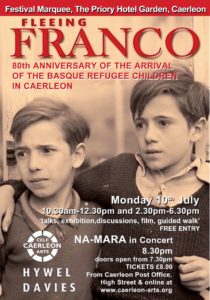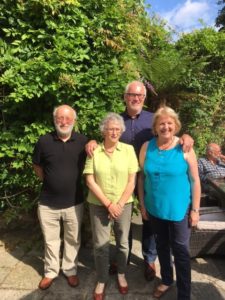 The 80th anniversary of the Basque refugee children’s arrival in Caerleon was celebrated as part of the Caerleon Arts Festival at the Festival Marquee, Priory Hotel, Caerleon in July 2017, the very date the children arrived 80 years ago.
The 80th anniversary of the Basque refugee children’s arrival in Caerleon was celebrated as part of the Caerleon Arts Festival at the Festival Marquee, Priory Hotel, Caerleon in July 2017, the very date the children arrived 80 years ago.
This day was pleasantly re-lived throughout the day’s itinerary. A cool breeze was blowing through the marquee at the grounds of the hotel where a group of people local to Caerleon sat waiting with infectious smiles to welcome visitors. Books and pamphlets were being displayed for sale and a fine exhibition by the BCA’37 UK was set up at one side of the marquee. It included interesting photographs of the camp at North Stoneham near Southampton where the children had arrived on the SS Habana from Bilbao, and further on there were pictures of homes/colonias where children were sent to from this original camp including Caerleon and of course, there were photos of the children themselves: Newly arrived children looked out at you in bewilderment. Who would not want to care for them? There was also an array of 1937 newspaper clippings reporting the arrival of these children.
The session, lasting almost two hours started with Chris Thomas, the organiser, reading the cheerful description of the delightful children on the day they arrived at Caerleon train station. He continued to go over the day’s programme with a full marquee of people gathered to listen and contribute to this fascinating story, many of whom were in some way directly connected to it.

L-Rt Chris Thomas, Carmen Kilner, Eddie Butler and Cllr Gail Giles
In an engaging manner, the‘ trio’ of panellists conveyed the history of the refugee children from three different but entwining perspectives. Carmen Kilner, the daughter of one of the teachers who came on the SS Habana and who is also the secretary of The Basque Children Association of ’37, gave a picture of the crisis in the Basque country at the time of the evacuation of the children and their devastating separation from their home and family. She told of their traumatised state when they arrived and how difficult it had been politically to organise such a huge undertaking in England and how efficiently and wholeheartedly the British public responded to their need.
Gail Giles, the Welsh author of the booklet ‘From Bilbao to Caerleon’, presented her well researched dissertation of the political situation in Spain at the time of the children arriving in Caerleon. She spoke warmly of Mrs Maria Fernandez, a Spanish resident in the area who looked after these 56 courageous children with love, respect and understanding. Gail spoke of how some of the boys became the local football team with great success and even fame, and how the children performed Spanish songs and dances to raise funds for their maintenance. She pointed out how the poorest local people, perhaps unemployed miners, chipped in to help. It seemed that the children were lucky to have landed there, and as Carmen pointed out, there was a feeling of gratitude among the ‘children’ for the rest of their lives.
L-R Chris Thomas (event organiser), Hywell Davies, Cllr Gail Giles and Carmen Kilner.
Hywell Davis, author of ‘Fleeing Franco’, the third panellist, gave a more detailed historical background of the politics of the Civil War and the status quo politically in Wales which made for a sympathetic attitude to the plight of these children and indeed to that of Republican Spain as a whole and the Basque Country in particular. He mentioned one of the ‘colonies’ that was not so successful and how the Daily Mail unjustifiably tried to blacken the reputation of the refugees as a result of this.
Many questions were raised by the audience with very knowledgeable answers given. One felt totally immersed just as if one had been there.
L-Rt Chris Thomas, Carmen Kilner, Eddie Butler and Cllr Gail Giles.
And still more followed: a walk and talk about the village and the places the children lived in led by Chris Thomas.
As if this was not enough to swell our hearts, after a sumptuous lunch at this Spanish family run Hotel, the film ‘Wales and the Basque Refugees: The Children’s Stories’ was shown on a large TV screen in a cosy oak panelled room of the hotel with Eddie Butler introducing it as well as he himself being the presenter in the actual film. People sat where they could find an inch of space, some dangling their legs over the side of a table, others sitting in rows on comfy chairs. Demand was so great that this was followed by an equally packed second showing of the film, again introduced by Eddie Butler.
Pendragon House, former home to 30 or so niños.
There was a second panel discussion with Gail Giles, Dylan Moore who works with the Sanctury Project a local organisation that helps refugees integrate with the community and John Griffiths AM for Newport East .
Juan and Jorge Senso
The panel discussion then got
underway with much audience participation. A wide variety of issues
But before this started two young Spanish brothers – Juan and Jorge Senso, who attend a local school – read extracts from a newsletter written by the young Basque refugees 80 years ago where they describe their experiences in Caerleon. It was a very moving and poignant experience.
were considered in a very thoughtful and sympathetic manner, from how to help refugees become
integrated in the local community, to press coverage, the role of sport, language and housing problems and much discussion and concern for ‘best practice’. It was clear that the local people are proud of their long history of welcoming refugees.One was left thinking that if the Basque children received an equally caring and considered reception, then no wonder Caerleon was such a successful and much loved home for them.
L-Rt Dylan Moore, Cllr Gail Giles and John Griffiths AM
The final event was a concert by the folk duo na-mara, made up of Rob García – son of a niño and master of many stringed instruments: mandolin, guitar, mandola and bandurria, and Paul McNamara a fine singer and songwriter. Together they were quite wonderful. Some of their own songs were about the Spanish Civil War, others about the Basque children and others from folk traditions around the world. They were a delight to hear musically and we could have kept listening to their sung stories for much longer.
Folk duo na-mara
Throughout this day there was the ever present sense of the ties that exist between Caerleon and the Basque Country where the refugee children came from. The dual pronged existence of an immensely beautiful rural area together with its heavy industry is to be seen in both places. The oldest transporter bridge is in the outskirts of Bilbao and there is one near Caerleon in Newport. There were, for many years, Welsh miners working in the iron mines in the Basque country and Basque miners in the coal mines in Wales. Merchant ships exchanged these minerals from one country to the other. It seems also that the fight for social justice is equivalent and the people in both places are so warm and friendly. Perhaps I am biased being a daughter of a father from the Welsh border who helped in the Civil war by bringing food to the republicans on a merchant ship and a mother who came from Bilbao on the SS Habana as an assistant!
Maria Dolores Power (Lita)
Leave a Reply